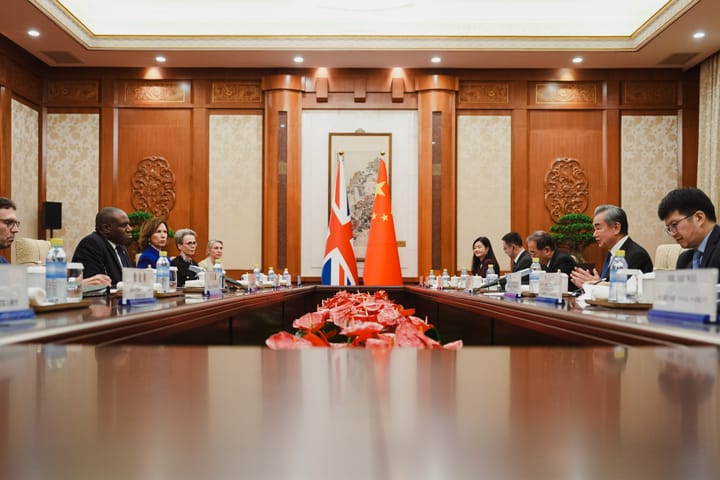The Risk of Private Military Contractors

Private military contractors have become a significant component of the United States' military operations, particularly in the context of modern warfare and national security strategies. Their involvement has grown notably in the post-9/11 era, where the U.S. military increasingly relied on these private entities to fulfill roles traditionally reserved for government forces, including security, logistics and training operations in conflict zones such as Iraq and Afghanistan. This reliance was so strong, that “...by the later years of the wars, half of total U.S. personnel deployed in Iraq and Afghanistan were private contractors,” according to an analysis of Pentagon budgetary reports. Since the conclusion of those conflicts, the United States has dropped or ended many of its contracts with PMCs, leading to an industry-wide pivot to other countries and other battlefields. By nature of their existence, being both a U.S. corporation and operating overseas, they create a legal gray area that many exploit to escape U.S. law. The operation of Private Military Companies must be brought under centralized oversight to prevent unauthorized activities that could compromise national security interests.
Particularly following high-profile incidents such as the 2007 Blackwater shootings in Baghdad, there were increased calls for stricter regulations and accountability measures within the private military industry, leading to the establishment of frameworks such as the Montreux Document and the International Code of Conduct for Private Security Service Providers. These initiatives aim to ensure compliance with human rights standards and clarify the legal status of contractors. However, they have largely failed to hold to account the broader actions of U.S.-based PMCs, who still operate with a total disregard of the overall security policy of the United States.
The use of PMCs in the United States has a complex history, rooted in the military's reliance on private entities for various support functions. The origins of PMCs can be traced back to the American Revolutionary War, yet they were never a significant part of the U.S.’s security policy. It was not until the end of the Cold War — a century later — and following the subsequent reduction in military funding that the outsourcing of military operational duties gained significant traction. Today, according to the aforementioned Pentagon budget analysis, “from fiscal year 2002 to fiscal year 2021, 55% of all Pentagon spending went to private sector military contractors.”
One of the traditional roles of PMCs is to provide security services. Often, this includes protective details for corporate executives, diplomats, and other high-profile individuals, ensuring their safety in conflict zones and areas of instability. Essentially acting as highly-trained mercenaries, PMC’s would work for anyone for the right price. They mostly operated as direct support to business — not governments. This all started to change with the United States’ wars in the Middle East. Because of cost restrictions and the use of newer and corporate technologies, the United States began to rely more on PMCs for logistical and support roles essential to military operations. This included providing transportation, medical support and supply chain management in conflict zones. With an initial goal of just helping the military personnel to focus on combat and strategic objectives, the cheaper and less bureaucratic PMCs started to be relied on.
Over the years, even more so following the post 9/11 Middle Eastern conflicts and the shift to an all-volunteer military force, the dependence on contractors for logistical assistance has grown significantly. This shift has led to the outsourcing of more and more critical support services that were once handled by military personnel. According to a report by the International Peace Institute in Oslo, despite attempts by the Obama administration to “... reduce spending on private-sector providers of military security, intelligence and other critical services and return certain outsourced work back to government employees” PMC’s are still prominent today in U.S. Department of Defense budgets.
The ideal purpose of PMCs is to facilitate agile response and military effectiveness. The presence of PMCs enables the U.S. to project power swiftly in international crises. These contractors often operate in rapidly changing environments, providing crucial support services that enhance military effectiveness. In situations where U.S. military resources are stretched thin, contractors can fill gaps in capabilities.
From an economic perspective, PMCs offer cost-effective solutions, allowing the U.S. to avoid long-term commitments associated with conventional military forces. This flexibility is particularly advantageous in scenarios that necessitate rapid adjustments to military strategy. Contractors can be hired on a short-term basis to meet specific operational needs, providing a cost-effective alternative to maintaining a large, permanent military presence. While not intended to be a permanent solution, PMCs involved with in particular more technical aspects of military logistics often find themselves in positions of importance or even reliance, ingraining them permanently in military positions.
PMCs provide a variety of services, including security, logistics, and training, regularly employing former military personnel with specialized skills. The integration of advanced technology and cybersecurity capabilities is another area where PMCs have contributed in direct roles to the United States. For instance, in recent conflicts, AI has been utilized in combination with open-source data to enhance battlefield intelligence, demonstrating the evolving nature of warfare where private sector capabilities are increasingly integrated into military operations.
On a broader level, PMCs are involved in conflicts around the world. For example, the war in Ukraine, where coordinated efforts between Ukraine’s Ministry of Defense and private drone-manufacturing corporations have enabled the rapidly-evolving front of drone warfare to exist in any capacity. While the war in Ukraine is still fought primarily between the two countries, as most PMCs are from their respective warring nations, U.S. based PMCs are increasingly operating more and more around the globe in legal gray areas. Reports like the Gansler report have irrefutably shown deep failures in Department of Defense protocol around the freedom of PMCs to work outside the chain of command and outside any scrutiny into their actions.
Some legislation has aimed to solve this problem, however. The National Defense Authorization Act for fiscal year 2023, signed into law in December 2022, introduced several changes to defense acquisition policies that aim to enhance efficiency by restricting profit margins for PMCs and forbidding them to withhold technical knowledge after contracts expire. Even more so, since the release of the Gansler report, According to a report by the International Peace Institute in Oslo “...the Department of Defense has taken a number of steps to better prepare its forces to work with contractors." Still, the risk of misbehaving or rouge PMCs remains ever strong.
One of the primary controversies surrounding private military contractors is the challenge of establishing legal accountability for human rights violations committed by contractors. PMC personnel often operate in legally ambiguous spaces. Not accountable to military tribunals, but also hard to prosecute in a US Court. The lack of clear accountability has been exacerbated by domestic laws that struggle to apply to contractors operating in foreign countries, particularly in failed states where investigations are challenging to conduct.
The infamous shooting massacre by Blackwater personnel in Nisour Square, Baghdad, on September 16, 2007, serves as an example of these accountability issues. Seventeen civilians were killed, and subsequent investigations uncovered a pattern of misconduct, including document fabrication and rampant drug use among the personnel. It was only after substantial public outrage and legal changes that Blackwater’s operational immunity was revoked, a long legal and bureaucratic process, highlighting the delays in holding accountable serious violations.
The current policies surrounding PMCs have undergone significant changes in the past few years, with growing calls for enhanced oversight and accountability measures. Many firms once opposed regulation, asserting that the market would naturally correct any issues. Even public efforts, like the Montreux document, have been criticized as, according to Yale Law Review, being “..limited both because it does not create any binding commitments and because it is directed at PMC behavior in armed conflicts, which constitutes only a fraction of PMC activities.” However, as scrutiny intensified, a growing number of industry participants began advocating for regulation, provided they had the opportunity to influence its formulation. And while legislation is still making its way through Congress, any foreign policy approach must strongly forbid such self-regulation of an industry with the business of waging war.
The legal ambiguities surrounding the status of contractors have ignited debates about the precise scope of accountability laws. This includes questions about whether the regulations apply only to direct Department of Defense contractors or extend to those working for other agencies or third-party nationals operating in conflict zones. The evolving dialogue suggests a gradual shift toward acknowledging the necessity of regulatory frameworks to effectively address these pressing issues.
Looking ahead, the evolving role of PMCs in U.S. military operations is likely to significantly change how military logistics are run. As former military officials transition into contractor roles, there are calls for a reassessment of the ethical implications and operational structures surrounding PMCs. The military should establish clearer oversight mechanisms to ensure that these contractors operate under a coherent command structure, thereby enhancing accountability and improving outcomes in complex operational environments.
The impact of PMC’s in Ukraine is not minimal, and is no longer always about cost and rather more and more about logistical and technical support. Domestically, our own PMC’s have the capability to enable our global adversaries with important and critical training on how to combat directly with the United States. We need to restrict PMC’s ability to operate without the knowledge and permission of some central body, else risk our own companies fighting against our own national security interests.



